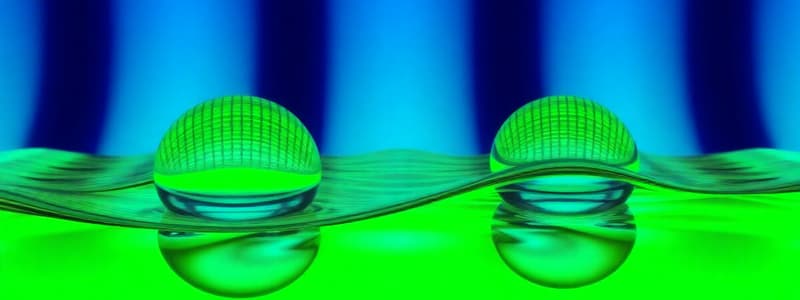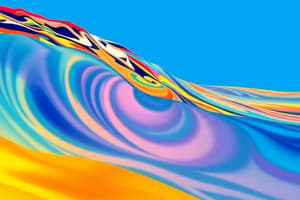Podcast
Questions and Answers
What causes the optical illusion observed when looking at a straw in a glass of water?
What causes the optical illusion observed when looking at a straw in a glass of water?
- Absorption of light
- Diffraction of light
- Refraction of light (correct)
- Reflection of light
Why does the image of a fish underwater appear to be in a different location?
Why does the image of a fish underwater appear to be in a different location?
- Because of the water's color
- Due to the size of the fish
- Due to the refraction of light (correct)
- Because the fish is moving quickly
In the context of light refraction, what is indicated by the term 'different refraction ability'?
In the context of light refraction, what is indicated by the term 'different refraction ability'?
- The distance light travels through air
- The capacity of light to absorb energy
- The varying angles at which colors bend (correct)
- The speed of light in a vacuum
Which factor does NOT contribute to optical illusions caused by refraction?
Which factor does NOT contribute to optical illusions caused by refraction?
What would most likely make an optical illusion more pronounced when viewing submerged objects?
What would most likely make an optical illusion more pronounced when viewing submerged objects?
Which of the following statements related to optical illusions is incorrect?
Which of the following statements related to optical illusions is incorrect?
What is the primary scientific standard related to the study of waves as mentioned?
What is the primary scientific standard related to the study of waves as mentioned?
In a laboratory simulation exploring refraction, what aspect would be most important to investigate?
In a laboratory simulation exploring refraction, what aspect would be most important to investigate?
Which effect of waves is most relevant when discussing the bending of light through different materials?
Which effect of waves is most relevant when discussing the bending of light through different materials?
What phenomenon occurs when our brain interprets light as always traveling in a straight line?
What phenomenon occurs when our brain interprets light as always traveling in a straight line?
What is likely the primary challenge for a young bird learning to catch fish as a result of refraction?
What is likely the primary challenge for a young bird learning to catch fish as a result of refraction?
In the context of investigating light through a glass prism, what aspect must be primarily analyzed?
In the context of investigating light through a glass prism, what aspect must be primarily analyzed?
What is the primary reason a straw appears bent when placed in a glass of water?
What is the primary reason a straw appears bent when placed in a glass of water?
Which application is closely related to the concept of refraction in everyday life?
Which application is closely related to the concept of refraction in everyday life?
What does the term 'optical illusion' specifically refer to in the context of science?
What does the term 'optical illusion' specifically refer to in the context of science?
Which factor is least likely to affect the perception of optical illusions caused by refraction?
Which factor is least likely to affect the perception of optical illusions caused by refraction?
Flashcards
Optical Illusion
Optical Illusion
A deceptive or misleading impression of reality caused by refraction of light.
Refraction
Refraction
The bending of light as it passes from one medium to another.
Refraction & Optical Illusions
Refraction & Optical Illusions
Refraction of light causes our perception of objects to differ from their actual position, creating optical illusions.
Different Light Colors
Different Light Colors
Signup and view all the flashcards
Prism
Prism
Signup and view all the flashcards
Light Rays
Light Rays
Signup and view all the flashcards
Fish Refraction
Fish Refraction
Signup and view all the flashcards
Bending Light
Bending Light
Signup and view all the flashcards
What is an optical illusion?
What is an optical illusion?
Signup and view all the flashcards
How do optical illusions work?
How do optical illusions work?
Signup and view all the flashcards
What is refraction?
What is refraction?
Signup and view all the flashcards
Why do different colors of light refract differently?
Why do different colors of light refract differently?
Signup and view all the flashcards
What happens to light when it passes through a prism?
What happens to light when it passes through a prism?
Signup and view all the flashcards
How does refraction affect a bird catching fish?
How does refraction affect a bird catching fish?
Signup and view all the flashcards
What is the link between refraction and optical illusions?
What is the link between refraction and optical illusions?
Signup and view all the flashcards
How can refraction be used in daily life?
How can refraction be used in daily life?
Signup and view all the flashcards
Study Notes
Day 1: Importance of Science
- Science is important.
Waves and Their Applications
- Unit 1, Module L covers waves and their uses.
Standard (MS-PS4-2)
- Waves are reflected, absorbed, or transmitted through different materials.
Day 2: Day-to-Day Applications of Refraction and Lab Simulation
- List day-to-day applications of refraction.
- Explain what an optical illusion is.
- Investigate refraction of light in different media.
Vocabulary
- Optical illusion
Starter
- Illusion: a deceptive/pretended appearance or impression.
What is Optical Illusion
- Your mind can be tricked by refraction.
- A straw in water appears bent due to refraction.
- Light doesn't travel in a straight line when passing from one medium to another (like water to air).
- Our brains expect light to travel in a straight line, creating optical illusions.
Search for the World Optical Illusion
- Find various optical illusions.
Check Your Understanding
- A young bird learning to catch fish faces challenges.
Which One is the Actual or Real Fish?
- A diagram shows a fish appears in a different position than its actual location.
Due to Refraction
- Fish may not appear where they are actually located.
Day-to-Day Experience of Refraction (Optical Illusion)
- Refraction makes objects appear bent.
Group Activity-Lab Simulation, Take Out Your Device and Investigate How Different Light Colors Refract in Glass Prism
- Use a simulation to investigate how light behaves through a prism
- Different colors refract at different angles.
Independent Activity (Worksheet 3)
- Worksheet 3 is assigned as an independent activity.
Day 3 & 4
- Project presentations are scheduled for days 3 and 4.
Studying That Suits You
Use AI to generate personalized quizzes and flashcards to suit your learning preferences.



